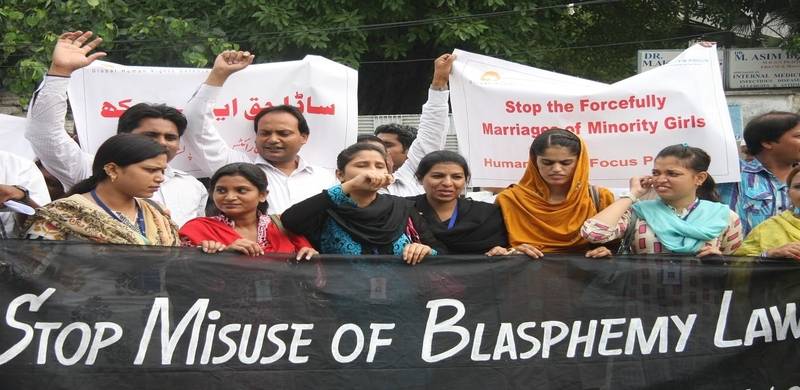
New York
Human Rights Watch has said that the Pakistani Supreme Court’s decision to reject as invalid the conviction of a man who spent 18 years in prison for blasphemy has highlighted the abuses inherent in the law.
On 25 September, 2019, the court had ruled that the prosecution failed to provide substantial evidence against Wajih-ul-Hassan, who had been sentenced to death in 2002 for allegedly writing blasphemous letters.
In a statement released, the HRW has said that Pakistan’s government should drop charges against those accused of blasphemy. It further stated that the government should order the release of all detainees held for blasphemy. Moreover, it has also called for a revision of the blasphemy law, with the ultimate aim of repealing it.
Brad Adams, the Asia director for HRW said, “The overturned conviction of a man imprisoned for 18 years highlights just one of many miscarriages of justice stemming from Pakistan’s vaguely worded blasphemy law."
He further added, “Typically, it’s members of religious minorities or other vulnerable communities who are wrongly accused and left unable to defend themselves.”
According to the Center for Social Justice, at least 1,472 people were charged under the blasphemy law from 1987 to 2016. Though no one has been executed, at least 17 blasphemy convicts are currently on death row, with others serving life sentences.
Amongst these blasphemy cases is that of Junaid Hafeez, a 33-year-old university lecturer who was arrested for blasphemy in March 2013 and has been in solitary confinement since June 2014.
In May 2014, Rashid Rehman, Hafeez’s lawyer, was fatally shot in his office in Multan in what was apparently seen as a backlash for his support for a blasphemy accused.
Moreover, the Human Rights Watch also raised concern over the killings of people who have criticised the blasphemy law. In January 2011, Salmaan Taseer, the governor of Punjab province, was killed by his own security guard because Taseer had sought to repeal the blasphemy law. In 2011, unidentified assailants killed the federal minorities affairs minister, Shahbaz Bhatti, who was an open critic of the blasphemy law.
The blasphemy law is frequently used against members of the religious minorities to settle personal disputes. The government rarely takes action against those responsible for attacks on those accused of blasphemy.
The blasphemy law is often used against members of religious minorities, frequently to settle personal disputes.
The Human Rights Watch has also called the Pakistani government to repeal sections 295 and 298 of the penal code, which includes the blasphemy law and the law discriminating against the Ahmadiyya community. Moreover, the government should also prosecute those responsible for planning and carrying out attacks against religious minorities.
The Asia director of HRW stated, “The Supreme Court took an important step by ending Hassan’s horrific ordeal, though many more charged with blasphemy are languishing in Pakistani prisons. Repealing the blasphemy law is necessary to ensure that all Pakistanis can live free from fear of unjust punishment and discrimination.”
Human Rights Watch has said that the Pakistani Supreme Court’s decision to reject as invalid the conviction of a man who spent 18 years in prison for blasphemy has highlighted the abuses inherent in the law.
On 25 September, 2019, the court had ruled that the prosecution failed to provide substantial evidence against Wajih-ul-Hassan, who had been sentenced to death in 2002 for allegedly writing blasphemous letters.
In a statement released, the HRW has said that Pakistan’s government should drop charges against those accused of blasphemy. It further stated that the government should order the release of all detainees held for blasphemy. Moreover, it has also called for a revision of the blasphemy law, with the ultimate aim of repealing it.
Brad Adams, the Asia director for HRW said, “The overturned conviction of a man imprisoned for 18 years highlights just one of many miscarriages of justice stemming from Pakistan’s vaguely worded blasphemy law."
He further added, “Typically, it’s members of religious minorities or other vulnerable communities who are wrongly accused and left unable to defend themselves.”
According to the Center for Social Justice, at least 1,472 people were charged under the blasphemy law from 1987 to 2016. Though no one has been executed, at least 17 blasphemy convicts are currently on death row, with others serving life sentences.
Amongst these blasphemy cases is that of Junaid Hafeez, a 33-year-old university lecturer who was arrested for blasphemy in March 2013 and has been in solitary confinement since June 2014.
In May 2014, Rashid Rehman, Hafeez’s lawyer, was fatally shot in his office in Multan in what was apparently seen as a backlash for his support for a blasphemy accused.
Moreover, the Human Rights Watch also raised concern over the killings of people who have criticised the blasphemy law. In January 2011, Salmaan Taseer, the governor of Punjab province, was killed by his own security guard because Taseer had sought to repeal the blasphemy law. In 2011, unidentified assailants killed the federal minorities affairs minister, Shahbaz Bhatti, who was an open critic of the blasphemy law.
The blasphemy law is frequently used against members of the religious minorities to settle personal disputes. The government rarely takes action against those responsible for attacks on those accused of blasphemy.
The blasphemy law is often used against members of religious minorities, frequently to settle personal disputes.
The Human Rights Watch has also called the Pakistani government to repeal sections 295 and 298 of the penal code, which includes the blasphemy law and the law discriminating against the Ahmadiyya community. Moreover, the government should also prosecute those responsible for planning and carrying out attacks against religious minorities.
The Asia director of HRW stated, “The Supreme Court took an important step by ending Hassan’s horrific ordeal, though many more charged with blasphemy are languishing in Pakistani prisons. Repealing the blasphemy law is necessary to ensure that all Pakistanis can live free from fear of unjust punishment and discrimination.”
